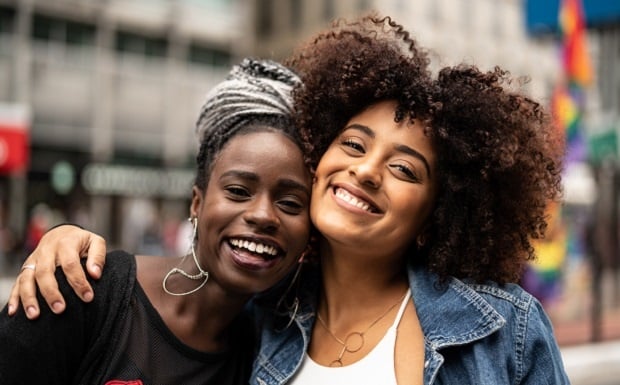
Women are playing an important role in Africa's bright future. But to get there they have had to persevere through economic hardships, unequal distribution of caregiving responsibilities, and a pervasive cultural norm that women belong in the home, writes Melinda French Gates.
On a visit to Senegal and Rwanda in June—my first trip to Africa since the pandemic began—I encountered example after example of African-born innovation. Among them: A rural university training the next generation of global health professionals. A business turning discarded tyres from mosquito breeding grounds into the base for synthetic turf and fuel for cement plants. A team of scientists developing cutting-edge vaccines and treatments for a range of infectious diseases.
After 20 years of visiting the continent and working with its leaders, I was not surprised to see African solutions to Africa's challenges. Nor was I surprised that so many of the talented people behind those solutions were women.
Two women in their 20s created E-cover, the Dakar-based tyre upcycler. Women make up 70 percent of the students at the University of Global Health Equity, the medical school I visited in Butaro, Rwanda, and half the staff at Institut Pasteur de Dakar, a renowned research institution and vaccine and diagnostic manufacturer.
Women's important role in Africa's bright future
These women are playing an important role in Africa's bright future. But to get there, they, like women worldwide, have had to persevere through economic hardships, unequal distribution of caregiving responsibilities, and a pervasive cultural norm that women belong, above all, in the home. Their hard-won success lift up their families and communities. And healthy, empowered women contribute to improved health equity, technological advances, and more robust financial futures for all. The World Bank estimates that if women had the opportunity to earn as much as men, total global wealth would increase by 14 percent.
Achieving gender equality is a global challenge—especially since the pandemic exacerbated the gender gap—and a global opportunity. A lot is possible when women have an equal chance to fulfill their potential.
Instead of leaving it up to individual women to surmount systemic barriers on their own, leaders can unlock progress much faster by implementing intentional policies and practices to remove those barriers altogether. There are various areas where actions now can make a big difference.
- Quality health care
When women can access quality medical care and make their own choices about health and family planning, it's not just that they are healthier and more productive; so are their families (including the men in their lives) and their communities. Yet too often, women's health issues are sidelined.
I visited the call centre at Babyl Rwanda, which provides 3 000 telehealth appointments with doctors and nurses every day, and is a great example of an organisation that makes sure women are not left behind. Medical care by phone is a transformative approach for all, but especially for rural women, who might find it difficult to pull away from their children and work to trek to a clinic, or to discuss matters of sexual health with their community health worker, whom they are likely to know personally.
READ | ANALYSIS: Lenina Rassool - South Africa is still falling short of gender parity for councillors
When Babyl Rwanda realised that women had trouble making appointments because Babyl accounts were linked to individual mobile phones, which often belonged to their husbands, they solved the problem by identifying patients through their national ID instead. Multiple people now could access appointments on the same phone, and the number of women using the service doubled.
- Support for women-owned businesses.
A World Bank study across 10 African countries found that companies owned by men had six times the capital investment as companies owned by women. In Senegal, even though 31 percent of businesses are owned by women, they only have access to 3.5 percent of available capital. Women are more likely than men to lack collateral and face both gender bias and a high cost for capital.
READ | How SA women are breaking up the boys' club in investment banking
Because Thiaba Camara Sy founded WIC Capital, which exclusively funds women-led companies, several women entrepreneurs in Africa—including Yaye Souadou Fall and Khady Diallo, the tyre upcyclers—have been able to close this gap, employ hundreds of people, and bring much-needed products to market. Imagine the breakthroughs Africans could benefit from if governments and financial institutions invested more in the transformative power of women entrepreneurs by directing resources to women-owned businesses, including improved access to affordable credit.
- Accessible child care
Several of the women I met at Institut Pasteur de Dakar (IPD) told me they can work only because they found child care. Many women don't have that option. A lack of accessible, affordable child care is not just a logistical challenge for families—it's a huge missed economic opportunity for their countries. According to the International Labour Organisation, comprehensive care policies would increase employment across Africa by nearly 11 percent for women, and 8 percent overall—because child care benefits men, too.
IPD is on the verge of becoming Africa's first high-volume site for the production of vaccines, including for Covid. Their progress depends in large part on women scientists' ability to contribute. So while the innovation happening in IPD's labs is exciting, the child care centre the institute is building may be just as important.
There's another change—a profound one—that would enable Africa to maintain, and even accelerate, its momentum. Nearly all the women I spoke with during my visit, no matter their age and experience, told me about the messages they hear all the time: "Don't soar too high or you'll never get married." "That's a man's business. What are you doing there?" "If you insist on becoming a doctor, at least don't become a surgeon or you won't be able to be a wife and mother."
READ | OPINION: Women's day - Time for leisure is not a luxury. It's a basic human right
Certainly this is not solely an African problem; women in my country, the United States, hear some version of these messages too. There's no easy way to change mindsets. But the first step is to understand what difference it makes when you do. Policies and programs to advance women can only go so far if they're not accompanied by strategic efforts to help people understand what's possible for everyone when women are encouraged to reach high.
In Senegal, I met a woman named Binta Diao, who at 14, was forced to leave school to marry a man almost twice her age. In her 20s, she began to take classes at Tostan, an organisation that provides courses on human rights, democracy, health, and economics to West African communities. Women who have participated in Tostan's training are helping to shift cultural norms—and showing their husbands that when women earn an income, men benefit too.
Binta began selling vegetables, then cow's milk, and now she's a successful radio host. She talks to her audience about maternal and newborn health, empowers other women to start their own businesses, and shares tips about which projects are likely to be profitable. "Before, I was just an ordinary woman," Binta told me. "I was minimised." Now when she speaks, people listen.
Thanks to efforts like hers, more communities are changing their views of women—and beginning to prosper. When the experiences of women like Binta are no longer minimised, and when Africa's leaders are able to see unlimited potential in all the continent's women, they'll be able to unlock extraordinary progress for all.
- Melinda French Gates is a co-chair of the Bill and Melinda Gates Foundation.
Disclaimer: News24 encourages freedom of speech and the expression of diverse views. The views of columnists published on News24 are therefore their own and do not necessarily represent the views of News24.




 Publications
Publications
 Partners
Partners























